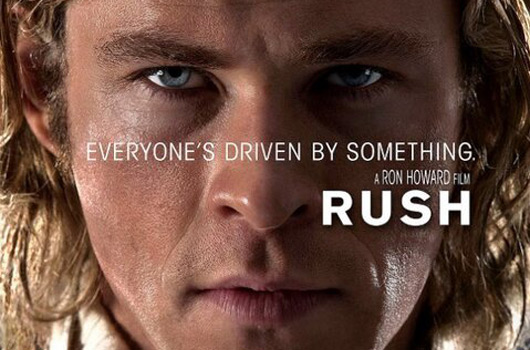It’s been receiving rave notices. Dave Woodhall joins in with the praise.
You can often tell what a film’s going to be like by the audience. This one had the highest male/female ratio I’ve seen since inadvertently stumbling into an audience participation showing of The Sound of Music and I’m sure the James Bond themes playing before the lights went out weren’t accidental. Yes, we’re in Alan Partridge territory.
For anyone unfamiliar with the story, Rush tells of the rivalry between two seventies Formula One drivers, the playboy James Hunt, played superbly by Chris Hemsworth, and robotic Niki Lauda (an equally mesmeric Daniel Bruhl). It’s a clash between two different philosophies, and between two different eras in motorsport. There’s the gifted amateur Englishman who believes life is one long party, the last of those dashing drivers who were the cavaliers of the tarmac at a time when death was a regular occurrence. Then there’s the Austrian, full of Teutonic efficiency and desire to win, the forerunner of today’s ruthless, safety-conscious professionalism.
The stage is set in the opening scenes, when Hunt arrives at hospital fresh from being beaten up by a fellow, and jealous, driver and within seconds is doing much the same that got him into trouble with the nurse attending to his injuries. Lauda, meanwhile, is giving up his family and their fortune to enter the world of racing cars. For him, nothing else matters.
Their rivalry begins with Hunt winning awards in junior races only to be overtaken by Lauda, who risks bankruptcy to buy himself into the big boys of Formula One, eventually becoming world champion while the Englishman continues to be hampered by his partnership with the aristocratic Lord Hesketh (Christian McKay). Eventually Hunt finds himself a car that can match Lauda’s, and the race is on…
It’s a film set in the seventies about racing drivers. It’s therefore brash, noisy and not for the faint-hearted. The scenes of accidents and their aftermath are particularly grisly while the camerawork is superb. Attention to detail is equally spot-on, with a soundtrack that will bring a thrill to the bank balances of some of the early seventies’ finest songwriters.
Good sporting films are rare, because most sporting stories aren’t very interesting to non-sports fans and the figures contained therein even less so. Rush has an advantage in that the chief protagonists were such contrasting characters, and director Ron Howard makes the most of this to produce a film that races along at a breathtaking pace while at the same time allowing the players to become believable and sympathetic. Yes, even the unemotional Lauda shows a human side eventually.
